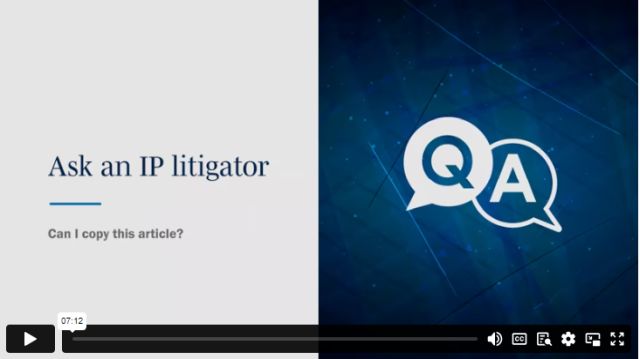Video transcript
Andrew Bernstein (00:05): Copyright law is one of the most misunderstood areas of law, even among lawyers. And the reason is: it can be very counterintuitive. I'm Andrew Bernstein and I'm with my colleague, Alexandra Peterson, to discuss the wild and wooly world of copyright law so that we can answer the question: Can I copy this article? Alex, can we?
Alexandra Peterson (00:25): The basic rule is that if someone creates a work—a book or an article, a movie, a song or even a computer program, they own copyright in that work, and that means no one else can copy it or reproduce it without their permission. So, if you see an article on the Internet, it doesn't matter whether you cut and paste the text, you print out the PDF, you download a copy to your desktop and share it with a colleague. You could be infringing copyright.
Alexandra Peterson (00:51): The same thing with recording a movie on your iPhone in the movie theatre or everyone's favourite example: downloading music from a torrent site like BitTorrent. Of course, "could be" is very different from "are" and Andrew's going to give you the rundown.
Andrew Bernstein (01:05): So, there's three basic reasons why you might not be infringing copyright even though you're copying something. And I'll admit that there are a lot more applicable to copying an article than downloading a movie or some music, but let's start with the first reason: time. Copyright has a fixed duration—life of the author, plus 70 years. So, if the author died more than 70 years ago, the article is in the public domain, or the song or the movie, and then you can do pretty much whatever you want with it.
The second reason is: Ownership. Let's say you represent an organization that employs people, and those people create something in the course of their employment. There's a pretty good chance that your organization, and not the author, owns the copyright. So, for example, this video, Alex and I wrote the script and Amy from our marketing group directed and produced it, but none of us are on the copyright in it.
It's owned by none other than Torys LLP. That doesn't mean you can copy it, but it does mean that Torys can do whatever it wants with it, even distributing copies online, which it probably did if you're watching it. Or even make a mash up of the whole "Ask an IP Litigator" series.
Alexandra Peterson (02:07): But what about our artistic integrity?
Andrew Bernstein (02:10): We will get to moral rights at the end! So, the most important lesson about this ownership is that if your employees are creating works, then make sure the terms of their employment make it clear that you're the owner. This ensures that you stay away from problems down the road on the question of what is and what isn't in the scope of their employment.
Third, and finally, it's possible that your copying falls into an exception or defense to copyright. And the most prominent and important of those is fair dealing, which Alex will explain.
Alexandra Peterson (02:38): So, the fair dealing analysis is a two-step test. At the first step, you look at whether the proposed copying is being done for a so-called allowable purpose, and these are set out in the Copyright Act. If you're making the copy for research, private study, education, parody, satire, criticism, review, or news reporting, it could be considered a fair dealing.
At the second step, you look at whether the copying or the dealing is fair. And at that stage, you essentially look at the overall context of the copying. The real purpose of the dealing. So, in other words, if you're downloading an article for research purposes, is the ultimate goal of your research for commercial purposes, or the furtherance of some other scholarly work?
You look at how much of the article is being copied relative to the whole, the importance of the part of the article that you're copying relative to the entire thing, alternatives available to copying, the effect of copying on the market for the work. So, for example, if you're reproducing a small excerpt from an opinion column from The Globe, which you're reviewing for a webinar you're presenting to students on the general state of opinion columns in Canadian newspapers that could be considered fair dealing.
The allowable purpose could be education. You're only using a small part. You're presumably not charging a fee for your webinar. On the other hand, reproducing an entire article multiple times, even if it's for an allowable purpose like research. If that research is ultimately being done for commercial purposes, like you're using it in a marketing pitch for your own product, that might not be considered fair dealing.
Ultimately, though, it's a highly contextual analysis and it's hard to predict how the analysis will shake out, especially in more borderline cases.
Andrew Bernstein (04:21): I'll be honest, Alex, that analysis sounds super confusing and hard to apply.
Alexandra Peterson (04:25): That's why copyright lawyers like us are so popular.
Andrew Bernstein (04:28): I thought it was our good looks and charming personality.
Alexandra Peterson (04:31): That is totally wrong.
Andrew Bernstein (04:33): I see that now. Speaking of totally wrong, let's talk about this scenario. You really, really, really want to copy something, you don't want to infringe, but you don't fit into any of these exceptions. What do you do then? The answer is pretty straightforward. You're allowed to license the right to copy from the copyright holder. And like Baskin-Robbins, there are 31 flavours of licenses to choose from.
Alexandra Peterson (04:53): Really? 31?
Andrew Bernstein (04:55): Alex, I love ice cream. Give me a little artistic license. There are many, many different types of copyright licenses. You can license the rights to copy an article. You can license the rights to turn the article into a movie. You can license the rights to include music in your movie. You can license something only for a particular territory like Canada or even Ontario.
You can license exclusively, meaning no one else gets to, or not exclusively, meaning that the copyright owner can re-license it.
Alexandra Peterson (05:21): Okay, Andrew, we get the point. 31 flavours.
Andrew Bernstein (05:24): Can we go for ice cream now?
Alexandra Peterson (05:25): Not until we do moral rights!
Andrew Bernstein (05:26): Alright, your turn. But let's keep it brief, I'm hungry.
Alexandra Peterson (05:29): Moral rights, like copyright, are actually a bundle of different rights. And they're intended to protect an artist's association with a work. They can be subdivided into the right of attribution, so the right of an author to have their name associated with an article publicly or to remain anonymous if they so choose. There's the right of association, meaning the right to control what a work is associated with.
And a good example of that would be if a political movement were to hand out copies of an article at a rally, some authors might not like that their article is being associated with a particular cause. And lastly, there's the right to integrity, meaning the right to have a work preserved in its original form.
So, in the case of an article, an author might argue that their moral rights were violated if someone edited that article to remove references to some topic the person found offensive, that could be considered and infringement of the right to integrity. The interesting thing about moral rights is that they can't be transferred or licensed. They belong only to the author, but they can be waived in whole or in part.
What happens to the moral rights of an author, whether the author will waive all or part of their moral rights, is often a part of the negotiation process when an author is licensing their work. The takeaway for the purposes of copying in an article is to be mindful that just because something is fair dealing, it could still potentially infringe an author's moral rights depending on what you're doing with it, especially if you're proposing to alter it in a way that could be interpreted as changing its original meaning or intent.
Andrew Bernstein (07:01): Okay, that's very interesting. And that's it for our video. Alex and I are going for ice cream. Thanks very much, everyone.
Copyright ownership is a nuanced and highly contextual area of legal analysis. In this video, Andrew Bernstein and Alexandra Peterson discuss the essentials of the legal framework around copyright to help answer the question: can I copy this article?
We cover:
- What constitutes copyright infringement
- Reasons why you might not be infringing copyright, including exceptions or defenses to copyright like fair dealing
- What constitutes fair dealing
- Types of copyright licenses
- Moral rights that protect an artist's association with a work
Click here to see other videos in this series.
The content of this article is intended to provide a general guide to the subject matter. Specialist advice should be sought about your specific circumstances.


